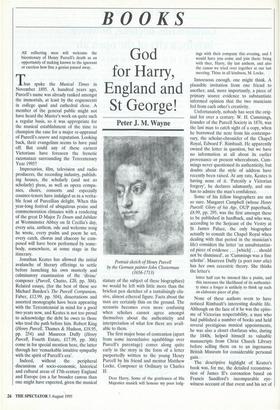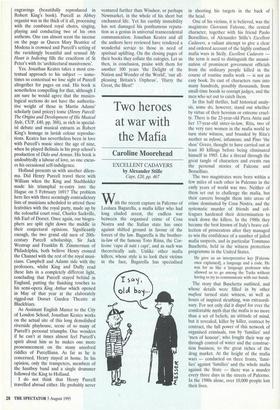BOOKS
God for Harry, England and St George!
Peter J. M. Wayne
All reflecting men will welcome the bicentenary of Henry Purcell's death as an opportunity of making known to the ignorant or careless how fine a genius passed away.
Thus spake the Musical Times in November 1895. A hundred years ago, Purcell's name was already ranked amongst the immortals, at least by the cognoscenti in college quad and cathedral close. A member of the general public might not have heard the Master's work on quite such a regular basis, so it was appropriate for the musical establishment of the time to champion the case for a major re-appraisal of Purcell's oeuvre and reputation. Looking back, their evangelism seems to have paid off. But could any of these earnest Victorians have foreseen the frenetic razzmatazz surrounding the Tercentenary Year 1995?
Impresarios, film, television and radio producers, the recording industry, publish- ing houses, the scholarly (and not so scholarly) press, as well as opera compa- nies, choirs, consorts and especially counter-tenors have indulged us in a verita- ble feast of Purcellian delight. When this year-long festival of ubiquitous praise and commemoration climaxes with a rendering of the great D Major Te Deum and Jubilate at Westminster Abbey on St Cecilia's day, every aria, anthem, ode and welcome song he wrote, every psalm and poem he set, every catch, chorus and chacony he com- posed will have been performed by some- body, somewhere, at some stage in the itinerary.
Jonathan Keates has allowed the initial avalanche of literary offerings to settle before launching his own masterly and culminatory examination of the 'divine' composer (Purcell, Chatto, £20, pp. 304). Related essays, (for the best of these see Michael Burden's The Purcell Companion, Faber, £12.99, pp. 504), dissertations and assorted monographs have been appearing with the Tercentennial in mind for a good two years now, and Keates is not too proud to acknowledge the debt he owes to those who trod the path before him. Robert King (Henry Purcell, Thames & Hudson, £18.95, pp. 254) and Maureen Duffy (Henry Purcell, Fourth Estate, £17.99, pp. 306) come in for special mention here, the latter through her 'remarkable intuitive sympathy with the spirit of Purcell's era'.
Indeed, without the peripheral discussions of socio-economic, historical and cultural areas of 17th-century England and Europe (on a far broader canvas than one might have expected, given the musical Portrait sketch of Henry Purcell by the German painter John Closterrnan (1656-1713) stature of the subject of these biographies) we would be left with little more than the briefest pen sketches of a tantalisingly elu- sive, almost ethereal figure. Facts about the man are certainly thin on the ground. The scenario becomes even more confusing when scholars cannot agree amongst themselves about the authenticity and interpretation of what few there are avail- able to them.
The first major bone of contention (apart from some inconclusive squabblings over Purcell's parentage) comes along quite early in the story in the form of a letter purportedly written to the young Henry Purcell by his friend and mentor Matthew Locke, Composer in Ordinary to Charles
Dear Harry, Some of the gentlemen of His Majesties musick will honour my poor lodg-
ings with their company this evening, and I would have you come and join them: bring with thee, Harry, thy last anthem, and also the canon we tried over together at our last meeting. Thine in all kindness, M. Locke.
Innocuous enough, one might think. A plausible invitation from one friend to another, and, more importantly, a piece of primary source evidence to substantiate informed opinion that the two musicians fed from each other's creativity.
Unfortunately, nobody has seen the orig- inal for over a century. W. H. Cummings, founder of the Purcell Society in 1876, was the last man to catch sight of a copy, when he borrowed the note from his contempo- rary, the scholar-chronicler of the Chapel Royal, Edward F. Rimbault. He apparently owned the letter in question, but we have no information at all about its earlier provenance or present whereabouts. Cum- mings never questioned its authenticity, but doubts about the style of address have recently been raised. At any rate, Keates is having none of it. 'Patently a Victorian forgery', he declares adamantly, and one has to admire the man's confidence.
Some of his fellow biographers are not so sure. Margaret Campbell (whose Henry Purcell: Glory of his Age, OUP paperback, £8.99, pp. 295, was the first amongst these to be published in hardback, and who was, according to the Serjeant of the Vestry at St James Palace, the only biographer actually to consult the Chapel Royal when dealing with that period in the musician's life) considers the letter 'an unsubstantiat- ed piece of evidence . . . [which] . . . should not be dismissed', as 'Cummings was a fine scholar'. Maureen Duffy (a poet inter alia) has her own eccentric theory. She thinks the letter's
latter half can be intoned like a psalm, and this increases the likelihood of its authentici- ty since a forger is unlikely to think up such an elaborate piece of play.
None of these authors seem to have noticed Rimbault's interesting double life. Although on the face of it he was the epito- me of Victorian respectability, a man who had published a number of books and held several prestigious musical appointments, he was also a closet charlatan who, during the 1840s, helped himself to valuable manuscripts from Christ Church Library before selling them on to an ingenuous British Museum for considerable personal gain.
The descriptive highlight of Keates's book was, for me, the detailed reconstruc- tion of James II's coronation based on Francis Sandford's incomparable eye- witness account of that event and his set of engravings (beautifully reproduced in Robert King's book). Purcell as Abbey organist was in the thick of it all, processing with the combined royal choirs, singing, playing and conducting two of his own anthems. One can almost scent the incense on the page as Queen Mary Beatrice of Modena is crowned and Purcell's setting of the ravishingly beautiful and sensual My Heart is Indicting fills the cruciform of St Peter's with its 'architectural massiveness'.
Yes. Jonathan Keates takes a most con- textual approach to his subject — some- times so contextual we lose sight of Purcell altogether for pages on end. His book is nonetheless compelling for that, although I am sure he would agree that the musico- logical sections do not have the authorita- tive weight of those in Martin Adams' scholarly (and pricey) tome (Hemy Purcell: The Origins and Development of His Musical Style, CUP, £40, pp. 388), as rich in special- ist debate and musical extracts as Robert King's homage in lavish colour reproduc- tions. Keates has nevertheless been in love with Purcell's music since the age of nine, when he played Belinda in his prep school's production of Dido and Aeneas. His book is undoubtedly a labour of love, so one excus- es his occasional self-indulgence.
Holland presents us with another dilem- ma. Did Henry Purcell travel there with William when the King and Stadtholder made his triumphal re-entry into the Hague on 5 February 1691? The problem here lies with three seemingly contradictory lists of musicians scheduled to attend these festivities with the royal party, made up by the colourful court roué, Charles Sacicville, 6th Earl of Dorset. Once again, our biogra- phers are split right down the middle in their conjectural opinions. Significantly enough, the two grand old men of 20th- century Purcell scholarship, Sir Jack Westrup and Franklin B. Zimmerman of Philadelphia, both believe Henry crossed the Channel with the rest of the royal musi- cians. Campbell and Adams side with the professors, whilst King and Duffy read these lists in a completely different light, concluding that Purcell stayed behind in England, putting the finishing touches to his semi-opera King Arthur which opened in May of that year at the elaborately rigged-out Dorset Garden Theatre at Blackfriars.
As Assistant English Master to the City of London School, Jonathan Keates works on the actual site of this long demolished riverside playhouse, scene of so many of Purcell's personal triumphs. One wonders if he can't at times almost feel Purcell's spirit about him as he makes one more pronouncement on the many unsolved riddles of Purcelliana. As far as he is concerned, Henry stayed at home. In his opinion, only the trumpeters, members of the hautboy band and a single drummer followed the King to Holland.
I do not think that Henry Purcell travelled abroad either. He probably never ventured further than Windsor, or perhaps Newmarket, in the whole of his short but enchanted life. Yet his earthly immobility has not damaged his posthumous reputa- tion as a genius in universal transcendental communication. Jonathan Keates and all the authors here reviewed have rendered a wonderful service to those in need of spiritual uplifting. On the closing pages of their books they collate the eulogies. Let us then, in conclusion, praise with them for another 100 years 'the Delight of the Nation and Wonder of the World', 'our all- pleasing Britain's Orpheus', 'Harry the Great, the Blest!'



















































 Previous page
Previous page